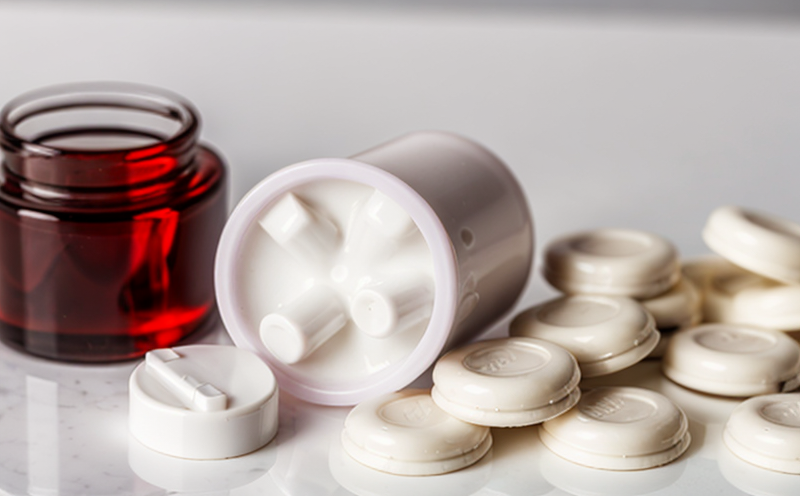USP Tablet Coating Adhesion Testing
The USP Tablet Coating Adhesion Test is a critical procedure within pharmaceutical testing that ensures the integrity and efficacy of coated tablets. This test assesses the bond strength between the coating layer and the core tablet, which is essential for maintaining the uniformity and stability of the drug product during processing, storage, and handling.
The importance of this test cannot be overstated. Coatings are used to protect active pharmaceutical ingredients (APIs), enhance taste, improve appearance, facilitate easier swallowing, and provide a controlled release mechanism. The USP Tablet Coating Adhesion Test is designed to simulate the stress that the coating may encounter during transportation, handling, and use.
The test typically involves applying a known force to an area of the coated tablet. If the coating does not remain adhered, it indicates potential issues with the coating's quality or stability. This could lead to degradation of the API, affecting drug efficacy and patient safety. Therefore, this test is a cornerstone in ensuring compliance with Good Manufacturing Practices (GMP) and regulatory requirements.
Accurate and reliable results from this test are crucial for pharmaceutical manufacturers aiming to maintain high standards of quality control. The procedure adheres strictly to the guidelines set forth by the United States Pharmacopeia, which is recognized globally as a standard in drug quality testing.
The apparatus used for this test includes a tablet coating adhesion tester or similar equipment that can apply a controlled force to the coated tablets. The method involves measuring the amount of force required to detach the coating from the core tablet. This measurement provides valuable insights into the robustness of the coating, which is vital for ensuring product stability and safety.
The test results are typically expressed in terms of the force (in Newtons) or percentage of coat weight loss. Compliance with USP specifications ensures that the coating adheres sufficiently to the core tablet without excessive friability or disintegration issues. This not only enhances the shelf life of the product but also reduces the risk of contamination and degradation, thereby improving patient outcomes.
Understanding the parameters involved in this test is crucial for pharmaceutical quality managers and compliance officers. The key factors include ensuring proper sample preparation, applying consistent force, and interpreting results accurately to meet regulatory standards. R&D engineers can leverage these insights to optimize coating formulations, enhancing product performance and manufacturability.
International Acceptance and Recognition
- The USP Tablet Coating Adhesion Test is widely recognized across the globe for its rigorous methodology in ensuring drug quality. Regulatory bodies such as the European Medicines Agency (EMA), the World Health Organization (WHO), and various national pharmacopeias incorporate this test into their guidelines.
- Pharmaceutical companies around the world adhere to these standards, ensuring consistent quality across international markets. Compliance with USP specifications is essential for gaining market access in regions that prioritize stringent regulatory compliance.
Benefits
The USP Tablet Coating Adhesion Test offers numerous benefits to pharmaceutical manufacturers, quality managers, and R&D engineers. By ensuring the adherence of coatings to the core tablets, this test enhances product stability, shelf life, and overall efficacy.
- Enhanced Drug Stability: The test helps in identifying any potential weaknesses in the coating that could lead to degradation or loss of API potency. This ensures that the drug remains stable under various environmental conditions.
- Better Patient Compliance: Stable coatings improve the taste and appearance of medications, which can encourage better patient compliance, thereby enhancing treatment outcomes.
- Regulatory Compliance: Adherence to USP standards ensures that products meet international regulatory requirements, facilitating easier market access and reducing the risk of recalls or withdrawals.
Competitive Advantage and Market Impact
The USP Tablet Coating Adhesion Test provides pharmaceutical manufacturers with a competitive edge by ensuring superior product quality. This test not only meets but exceeds regulatory expectations, setting a benchmark for industry standards.
- Enhanced Reputation: By adhering to these rigorous testing protocols, companies can build a strong reputation for producing high-quality pharmaceuticals. This is particularly advantageous in competitive markets where trust and reliability are paramount.
- Innovation Opportunities: The insights gained from this test can be used to innovate new coating formulations that improve drug performance and patient experience.





